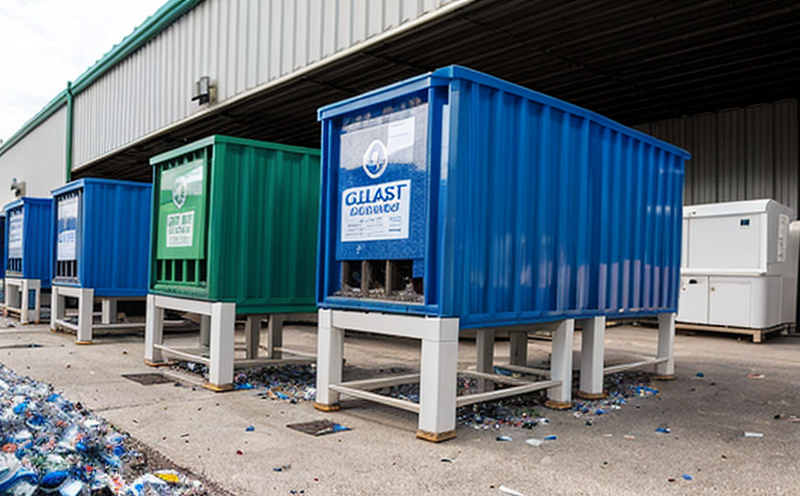EN 12892 Porosity of Recycled Glass
The EN 12892 standard is specifically designed to measure and evaluate the porosity of recycled glass. This test is crucial for quality assurance in waste management, recycling processes, and the production of secondary raw materials from recycled glass.
Porosity directly impacts the performance and durability of products made from recycled glass. High porosity can lead to lower strength and poorer thermal insulation properties. By quantifying porosity, manufacturers ensure that their recycled glass meets stringent quality standards, thereby enhancing product reliability and consumer confidence.
This test is applicable not only in recycling facilities but also in industries that use recycled glass as a raw material for manufacturing various products such as containers, tiles, and construction materials. The standard provides a consistent methodology to assess the porosity of different types of recycled glass, ensuring uniformity across production lines.
The measurement of porosity helps in optimizing recycling processes by identifying the optimal conditions under which recycled glass can be effectively used without compromising product quality. This is particularly important as the demand for sustainable and eco-friendly materials continues to grow.
Accurate porosity testing ensures that recycled glass retains its essential properties, such as chemical resistance and thermal stability, making it a viable alternative to virgin raw materials in many applications. In this section, we will delve deeper into the methodology, equipment used, and how this test is performed according to EN 12892.
The standard specifies the use of a mercury intrusion porosimeter for measuring the pore size distribution and total porosity of recycled glass samples. This instrument allows for precise measurement down to nanometer scales, providing detailed insights into the microstructure of the glass particles.
Scope and Methodology
| Aspect | Description |
|---|---|
| Samples | The samples should be representative of the recycled glass to be tested. They must be cleaned and cut into suitable sizes (typically cylindrical or cuboid shapes) to ensure consistent testing. |
| Preparation | The surface of the sample is degreased using solvents, followed by a thorough drying process. The sample is then placed in the porosimeter for measurement. |
| Instrumentation | A mercury intrusion porosimeter is used to measure pore size distribution and total porosity. This device applies controlled pressure to introduce liquid mercury into the pores of the sample, allowing for accurate measurement. |
| Calibration | The instrument must be regularly calibrated using reference materials to ensure accuracy in measurements. |
| Data Analysis | The data from the porosimeter is analyzed to determine the pore size distribution and total porosity. This information is critical for assessing the quality of recycled glass. |
Following these steps ensures that the test results are reliable and consistent, providing a clear picture of the porosity characteristics of the recycled glass sample.
Industry Applications
- Bottle Manufacturers: Ensures the quality of recycled glass used in manufacturing bottles, reducing costs while maintaining product integrity.
- Tile Manufacturers: Helps in selecting suitable recycled glass for tile production to ensure durability and aesthetic appeal.
- Ceramic Tile Producers: Guarantees the quality of raw materials used in ceramic tile manufacturing, enhancing product performance.
- Pavement Builders: Ensures the recycled glass used in pavement construction meets required specifications for strength and durability.
- Construction Companies: Provides insights into the suitability of recycled glass for various construction applications, promoting sustainability.
The accurate measurement of porosity using EN 12892 is essential in these industries to maintain product quality and compliance with international standards. By ensuring that recycled glass meets specific criteria, manufacturers can contribute to environmental sustainability while maintaining high-quality products.
Why Choose This Test
Selecting the appropriate test method is crucial for accurate assessment of recycled glass porosity. EN 12892 provides a standardized approach that ensures consistency and reliability in measurements across different laboratories.
The use of mercury intrusion porosimetry allows for precise measurement, even at very small pore sizes. This level of detail is invaluable for quality control purposes, enabling manufacturers to identify potential issues early on and adjust their processes accordingly.
By adhering to this standard, businesses can demonstrate compliance with international regulations and industry best practices. This not only enhances their reputation but also opens up opportunities for partnerships and collaborations within the sector.
The test results obtained through EN 12892 are widely accepted in both national and international markets, facilitating seamless trade and ensuring that recycled glass meets the required standards globally.
In summary, choosing this test ensures accurate, reliable, and internationally recognized measurements of recycled glass porosity, supporting sustainable practices and high-quality product development.





